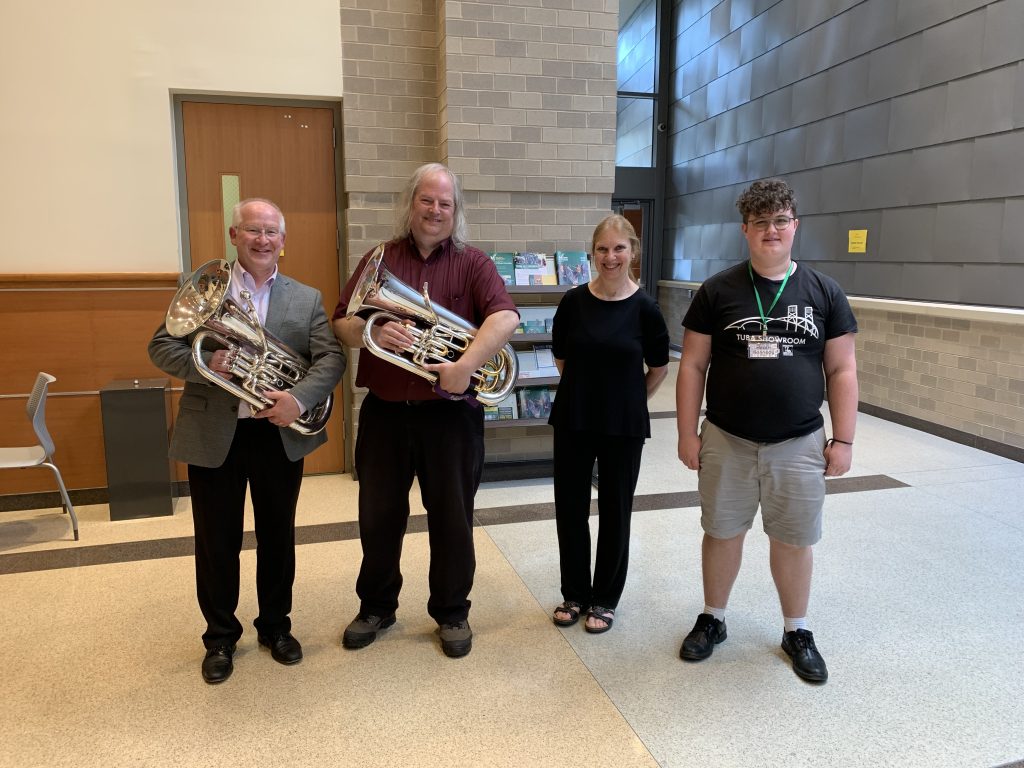Music student scores second-place finish at orchestral competition

(From left: Dr. Kevin Chiarrizzio, Liberty University; Dr. David Stern and Dr. Laura Artesani, University of Maine; Heath Kennedy)
A School of Performing Arts student recently received a high accolade at a regional music conference.
Heath Kennedy, a double major in tuba performance and music education, received second place in the mock orchestra auditions at the Northeast Regional Tuba & Euphonium conference at George Mason University in Fairfax, VA that took place on May 24. It is a prestigious competition – one that rewards the years of hard work and commitment to the craft demonstrated by Kennedy.
“I’ve been playing tuba for 8 years now!” Kennedy said. “I started at the end of fifth grade when I switched to the tuba from the euphonium. I also had previous musical experience, taking piano lessons since I was young.”
Kennedy spent much of the spring submitting for competitions such as this one. Landing a spot at NERTEC is a very big deal for a student of the tuba. Just getting in is an impressive feat on its own.
“For the NERTEC Tuba Mock Orchestral competition, I had to prepare five orchestral excerpts and record them for submission,” said Kennedy. “I worked on these excerpts for about two months, being coached by my applied lessons professor Dr. David Stern. It was a very long and tedious process.”
Long and tedious, perhaps, but also worthwhile, considering he landed a spot and went on to receive accolades – accolades that are not easy to come by. Kennedy spoke to the specifics that come with competing in the orchestral excerpt repertoire space.
“It’s all about consistency, and following the expected musical character that has been established,” he said. “There is little room for personal interpretation because most orchestral excerpts aren’t solos. You play how the composer intended, regardless of how you feel about it.”
Preparing these pieces for competition was an extended process. Kennedy practiced by playing alongside an oscillogram, which gave a visual representation of the sound amplitude being produced; this allowed him to discover inconsistencies that he might not otherwise have uncovered, which in turn led to cleaner, more consistent performance.
From there, Kennedy recorded his excerpts, submitted his best takes and awaited word from the organizers. While waiting, he started preparing for good news, practicing the competition’s live round excerpts.
Happily, he didn’t have to wait long.
“After two weeks, I was notified that I was one of the finalists for the NERTEC Mock Orchestral competition!” Kennedy said. “After that, it was time to start working even harder to prepare for the competition that was barely over a month away.”
Adopting an “if it ain’t broke” mindset, Kennedy maintained his same practicing process, albeit with a little extra help coming his way courtesy of a lesson with William Dietz, principal tubist with the Bangor Symphony Orchestra. Support from the School of Performing Arts would give Kennedy the necessary resources to attend the conference.
Unsurprisingly, Kennedy had a lot of positive takeaways from the experience.
“I’d say one of the best parts of the experience was being able to meet other tubists who are passionate about music, and tuba in general,” he said. “Talking with other competitors was great, just being able to go on about the tuba world.
“Attending masterclasses and performances was also fantastic,” he continued. “There were amazing performances by the Army Band Tuba Quartet, solo competition winners, and Dr. Stern with Dr. Laura Artesani as well.”
(Stern and Artesani, both faculty members in the School of Performing Arts, performed a recital at the conference with Dr. Kevin Chiarrizzio, faculty member at Liberty University. The program included the premiere performance of “Ice Sounds” by SPA faculty member Dr. Beth Wiemann.)
And of course, there was the whole “taking second prize” part of the proceedings.
“I got great feedback from the judges, and while I did very well, there’s always room to improve,” said Kennedy. “I look forward to taking their feedback and applying it to my future practice. It was truly an honor and a privilege to attend the conference and be able to compete against other tubists in the Northeast region and hold my own.”
